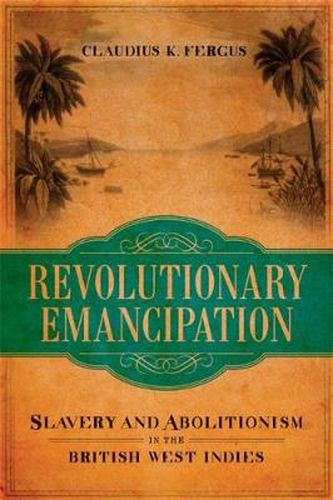Readings Newsletter
Become a Readings Member to make your shopping experience even easier.
Sign in or sign up for free!
You’re not far away from qualifying for FREE standard shipping within Australia
You’ve qualified for FREE standard shipping within Australia
The cart is loading…






Skillfully weaving an African worldview into the conventional historiography of British abolitionism, Claudius K. Fergus presents new insights into one of the most intriguing and momentous episodes of Atlantic history. In Revolutionary Emancipation, Fergus argues that the 1760 rebellion in Jamaica, Tacky’s War, the largest and most destructive rebellion of enslaved peoples in the Americas prior to the Haitian Revolution, provided the rationale for abolition and reform of the colonial system.
Fergus shows that following Tacky’s War, British colonies in the West Indies sought political preservation under state-regulated amelioration of slavery. He further contends that abolitionists’ successes, from partial to general prohibition of the slave trade, hinged more on the economic benefits of creolizing slave labor and the costs of preserving the colonies from destructive emancipation rebellions than on a conviction of justice and humanity for Africans.
In the end, Fergus maintains, slaves’ commitment to revolutionary emancipation kept colonial focus on reforming the slave system. His study carefully dissects new evidence and reinterprets previously held beliefs, offering historians the most compelling arguments for African agency in abolitionism.
$9.00 standard shipping within Australia
FREE standard shipping within Australia for orders over $100.00
Express & International shipping calculated at checkout
Skillfully weaving an African worldview into the conventional historiography of British abolitionism, Claudius K. Fergus presents new insights into one of the most intriguing and momentous episodes of Atlantic history. In Revolutionary Emancipation, Fergus argues that the 1760 rebellion in Jamaica, Tacky’s War, the largest and most destructive rebellion of enslaved peoples in the Americas prior to the Haitian Revolution, provided the rationale for abolition and reform of the colonial system.
Fergus shows that following Tacky’s War, British colonies in the West Indies sought political preservation under state-regulated amelioration of slavery. He further contends that abolitionists’ successes, from partial to general prohibition of the slave trade, hinged more on the economic benefits of creolizing slave labor and the costs of preserving the colonies from destructive emancipation rebellions than on a conviction of justice and humanity for Africans.
In the end, Fergus maintains, slaves’ commitment to revolutionary emancipation kept colonial focus on reforming the slave system. His study carefully dissects new evidence and reinterprets previously held beliefs, offering historians the most compelling arguments for African agency in abolitionism.